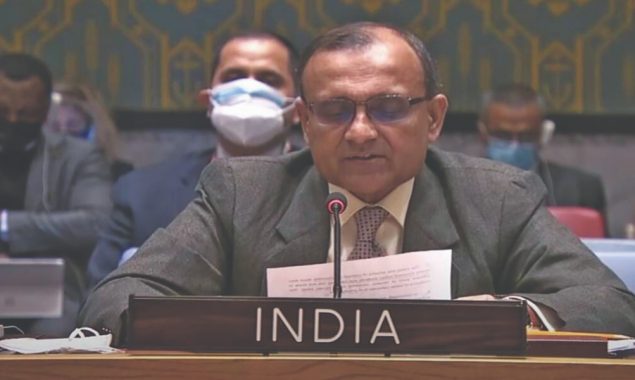Synopsis
By Shubhajit Roy

New Delhi – India’s statement at the UN lacked condemnation of the Russian attack on Ukraine, which President Vladimir Putin called a “special military operation”.
While it came around the same time as the announcement of the attack, India’s top diplomat at the UN — reading from a prepared script — expressed “regret” and said that the “situation is in danger of spiralling into a major crisis”.
Minutes later, explosions were heard in Ukraine’s capital Kyiv and the eastern port city of Mariupol, according to AFP.
India’s statement at the UN Security Council, which was made in a hurriedly called emergency meeting for the second time this week, said, “The Security Council had met two days ago and discussed the situation. We had called for urgent de-escalation of tensions and emphasized on sustained and focused diplomacy to address all issues concerning the situation.”
Speaking at the UNSC meeting, India’s Permanent Representative at the UN T S Tirumurti said, “However, we note with regret, that the calls of the international community to give time to the recent initiatives undertaken by parties to diffuse tensions were not heeded to.
The situation is in danger of spiraling into a major crisis. We express our deep concern over the developments, which if not handled carefully, may well undermine the peace and security of the region.”
He called for “immediate de-escalation and refraining from any further action that could contribute to a worsening of the situation”.
His remaining statement was about advocating diplomacy.
Now, India is in a tough spot, and these are reasons for the diplomatic dilemma.
FIRST, the West views this as condoning Russia’s actions and applying double standards while India raises the issue of “territorial integrity and sovereignty” when it comes to China.
SECOND, this is India’s diplomatic dilemma, which is because of India’s strategic ties with Russia and its dependence on Russia for military supplies — 60 to 70 per cent of India’s military hardware is of Russian-origin.
This is extremely crucial at a time when India has an ongoing border standoff with China.
Earlier this week, India had not condemned Russia’s statement of recognition of the two separatist regions of Donetsk and Luhansk.
While India may like to portray the statement as neutral, but the western bloc, led by the US, will not view it in that fashion.
THIRD, India has said that the escalation of tension along the border of Ukraine with the Russian Federation is a matter of deep concern. These developments have the potential to undermine peace and security of the region,” India’s Permanent Representative to the United Nations, T S Tirumurti, had said at the UN Security Council Meeting on Tuesday.
This is the closest New Delhi has gone so far to caution Putin’s Russia to not undertake risky behaviour that may escalate. It is euphemism and diplomatese for India telling Russia: don’t do it.
FOURTH, India’s worry remains its 20,000 Indian students and nationals, many of them who live close to the Ukraine-Russia border. Many of these students are enrolled in the medical colleges of Ukraine.
India has also emphasised that it was concerned about the safety and security of civilians.
He once again underlined that more than twenty thousand Indian nationals, including students, are located in different parts of Ukraine, including in its border areas. “We are facilitating the return of all Indian nationals, including Indian students, as required.”
So, a worried New Delhi has issued at least three advisories, including the latest one which has asked the students to leave the country temporarily.
Some students have been asking the Indian Embassy to convince the colleges to start online classes, so that their studies don’t get affected. While the Indian Embassy is trying to impress upon the Ukrainian colleges and universities to start online classes for the Indian students — so that their academics don’t suffer — it has asked them to leave the country at earliest available flights for the time being.
FIFTH, India has asked “all sides” to intensify diplomatic efforts to reach for an amicable solution at the earliest. This is again a time-tested line of India’s, where it doesn’t blame one side or the other for not being cooperative.
West has blamed Russia for starting the tension, and has put the ball in Putin’s court, whereas the Russian President has blamed NATO’s eastward expansion as a threat. “We call on all parties to exert greater efforts to bridge divergent interests. I would like to underline that the legitimate security interests of all parties should be fully taken into account,” the Indian diplomat said.
India has consistently advocated at the United Nations the need for peaceful settlement of disputes in accordance with international law and with agreements entered into by parties concerned.
“We believe that the solution lies in sustained diplomatic dialogue between the concerned parties. In the meantime, we strongly emphasize the vital need for all sides to maintain international peace and security by exercising the utmost restraint,” he said.
So, to sum it all, it is a debate within the Indian establishment about what to choose — principles and values on one side, and pragmatism and interests on the other side.
And, as a new conflict in the 21st century breaks out, India has a tough strategic choice to make.
Courtesy: The Indian Express
Read More News On
Catch all the International News, Breaking News Event and Latest News Updates on The BOL News
Download The BOL News App to get the Daily News Update & Follow us on Google News.




